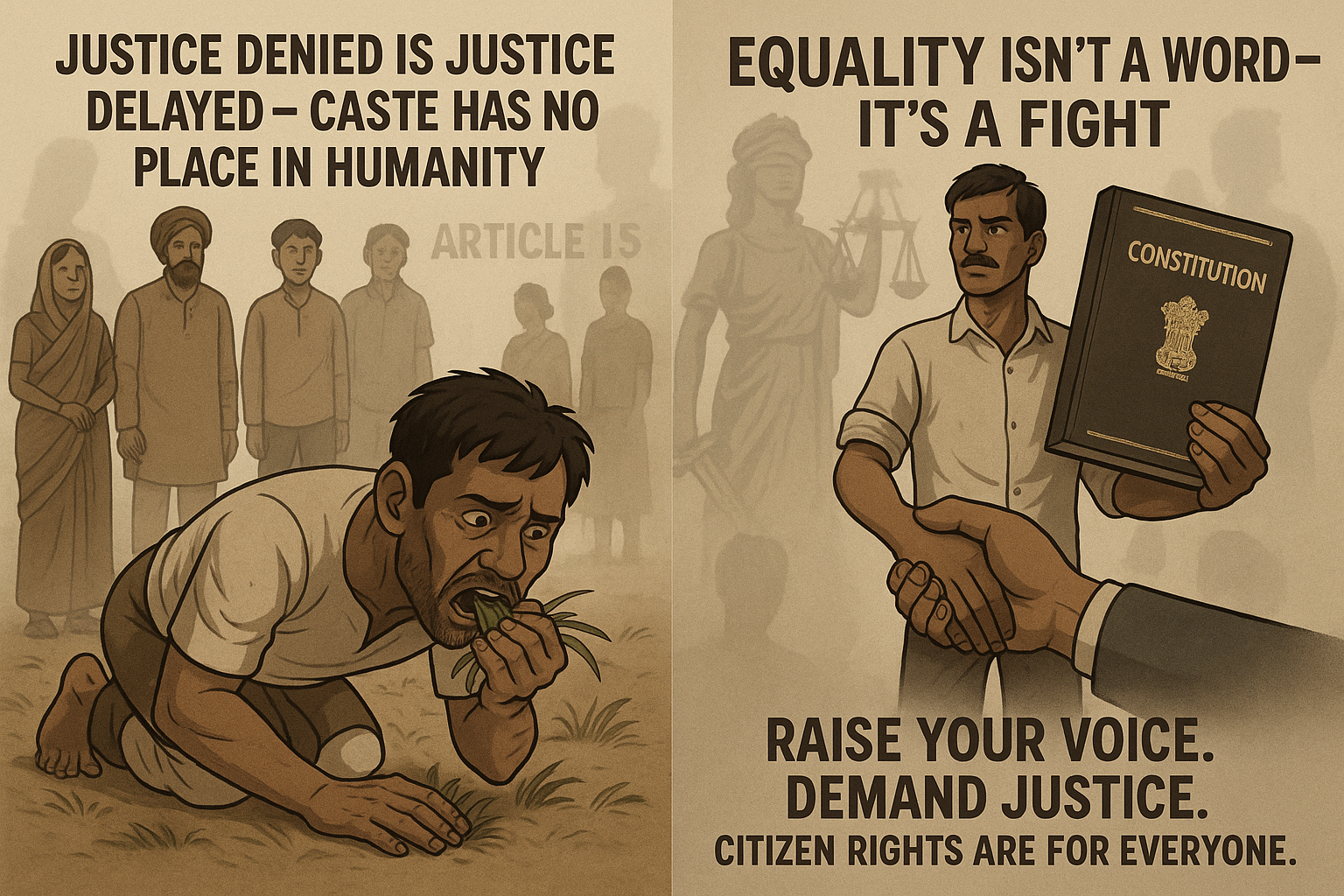Justice for Ganjam Dalits: When Citizens’ Rights Must Speak Up

In a shocking case from Ganjam district, Odisha, two Dalit men—Babula Nayak and his relative—were brutally attacked. Allegedly accused of cattle smuggling, they were forced to crawl, made to eat grass, drink drain water, and pressured to pay ₹30,000 before being assaulted
Eight men and a minor have been arrested, but this horrific episode underscores how deeply caste discrimination and violence persist—even in modern India.
Which Rights Were Violated?
- Right to Equality (Article 14):
The treatment these men faced—humiliating, brutal, caste-based—reflects a stark denial of equal protection under the law. - Right to Life & Dignity (Article 21):
Forcing humans to crawl, use unhygienic water, and endure physical abuse attacks their basic dignity and right to life. - Protection under SC/ST (Prevention of Atrocities) Act:
Since the victims are Dalits, the attackers can be prosecuted under this act. It provides enhanced penalties and legal safeguards for caste-based violence.
How Citizens Can Respond
✅ 1. Demand FIR Registration & Proper Charges
Ensure the police file a detailed FIR invoking the SC/ST Act. If they don’t—ask for it to be added. You can also file a private complaint.
✅ 2. Use RTI to Track Case Progress
File an RTI with the local police station or collector’s office. Ask:
- Has an FIR been lodged?
- Which sections of law/acts are invoked?
- What stage is the investigation at?
✅ 3. Approach Higher Authorities & Rights Bodies
- Write to the District Collector and State SC/ST Commission if the victim’s caste is involved.
- File a complaint with NHRC (National Human Rights Commission) or your state human rights commission.
✅ 4. Mobilize Community and Media
- Alert local media and social organizations about the violation.
- Organize peaceful awareness rallies or signature petitions.
- Encourage civil rights groups to monitor the case.
✅ 5. Support Victim Families
- Offer legal aid, counseling, or medical assistance.
- Ensure arrests of the attackers remain formally lodged.
Why This Matters to All of Us
Caste-based violence doesn’t end at one incident—it undermines the constitutional promise of equality and dignity for all. If Babula Nayak's attack goes unnoticed or unchecked, it signals that citizen rights are fragile, especially for marginalized groups.
But when people stand up through RTIs, petitions, public hearings, or legal actions—denial of justice becomes far more difficult.
What You Can Do Now
- Shout aloud: Share this story to raise awareness and prevent silence.
- Demand action: Encourage authorities to apply the SC/ST Act and ensure victim safety.
- Educate others: Explain how caste atrocities hurt every citizen’s dignity.
“Silence sustains injustice. Justice begins when citizens speak up.”
Let us not just sympathize. Let us mobilize—through legal action, public awareness, and solidarity. Only then can our constitutional rights become stronger than caste oppression.
- Goa
- Jammu & Kashmir
- Punjab
- Uttar Pradesh
- Uttarkhand
- Andaman & Nikobar Islands
- Andhra Pradesh
- Karnataka
- Kerala
- Lakshdweep
- Puducherry
- Tamilnadu
- Telangana
- Dadra &Nager Haveli, Daman &Diu
- Himachal Pradesh
- Gujarat
- Madhya Pradesh
- Maharashtra
- Rajasthan
- Legal
- Life Style
- Music
- Prop News
- Sports
- Technology
- SURAKSHA
- Education
- International
- Haryana
- BMA
- Bharat
- Business
- Entertainment
- Fashion & Beauty
- Health & Fitness
- Arunachal Pradesh
- Assam
- Bihar
- Chattisgarh
- Jharkhand
- Ladakh
- Manipur
- Meghalaya
- Mizoram
- Nagaland
- Odisha
- Sikkim
- Tripura
- West Bengal
- Chandigarh
- Delhi - NCR
- Bharat Aawaz
- IINNSIDE
- Business EDGE
- Media Academy



